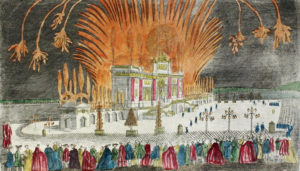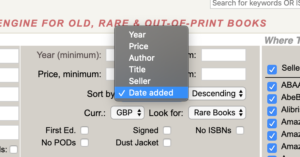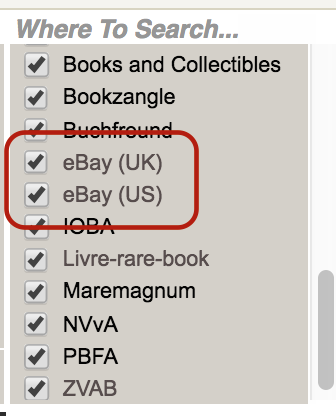Attentive users may have noticed that we recently added another new source for items to be included when searching for books and ephemera on viaLibri. We were already searching 160 different sources, and are always looking for more, so in January we again added to the count and began including books and ephemera from Getman’s Virtual Book Fairs – the oldest, largest and best known virtual book fair platform.
added to the count and began including books and ephemera from Getman’s Virtual Book Fairs – the oldest, largest and best known virtual book fair platform.
I’m confident that our customers will be pleased to find these books now included in their results when they search for them manually.
This will be especially good news if you are among the many viaLibri users who let the Libribot automate searching for the items listed on their want lists.
As we all know, when a virtual book fair opens its imaginary doors there is always a virtual rush to find and claim all the choicest items first. That can be difficult if you have a variety of interests and wants, all of which need to be searched for separately, one after the other. With a Getman virtual fair, however, viaLibri can do the searching for you and then email you a notification when matches have been found. The Libribot does all the work for you before the doors open.
This will also be good news for the exhibitors. viaLibri has over 160,000 active wants. All of them will be matched against the items in each new Getman’s Virtual Book Fair and then continue to be included in active viaLibri searches until the fair is closed on Sunday.
The next opportunity for all this to happen will be the Greenwich Village Virtual Antiquarian Book and Ephemera Fair, open to everyone on Saturday February 24th at 12 noon ET. A paid charity preview will also take place on Friday at 12 noon.
 It was formed in 2005 by the Asociación Profesional del Libro y Coleccionismo Antiguos with members from nearly all the Autonomous Communities of Spain. It operates as a non-profit association owned and controlled exclusively by its members.
It was formed in 2005 by the Asociación Profesional del Libro y Coleccionismo Antiguos with members from nearly all the Autonomous Communities of Spain. It operates as a non-profit association owned and controlled exclusively by its members.
 A few weeks ago we quietly released an exciting new feature for viaLibri. You can now sort results by the date they were put up for sale. This is a change that a lot of people have asked for in the past, and we think it will be very useful for a lot of people.
A few weeks ago we quietly released an exciting new feature for viaLibri. You can now sort results by the date they were put up for sale. This is a change that a lot of people have asked for in the past, and we think it will be very useful for a lot of people. We are pleased to announce that viaLibri now includes books from eBay as part of its search results. If you look in the “Where to Search” panel in the upper right hand corner of our home page search form you will see two check boxes for eBay.com and eBay.co.uk. When these have been ticked the old, rare and out-of-print “Buy It Now” book listings from those two sites will be added to all the items from all the other sites we already search. This means that over 30 million more items have now become searchable.
We are pleased to announce that viaLibri now includes books from eBay as part of its search results. If you look in the “Where to Search” panel in the upper right hand corner of our home page search form you will see two check boxes for eBay.com and eBay.co.uk. When these have been ticked the old, rare and out-of-print “Buy It Now” book listings from those two sites will be added to all the items from all the other sites we already search. This means that over 30 million more items have now become searchable.
